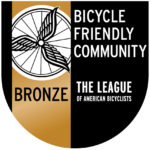
METROPOLITAN TOPEKA PLANNING ORGANIZATION
YOUR ALL-ACCESS WEBSITE FOR TRANSPORTATION PLANNING IN TOPEKA AND SHAWNEE COUNTY
Other Documents
Title VI Documents
The MTPO assures that no person shall, on the grounds of race, color, or national origin, as provided by Title VI of the Civil Rights Act of 1964 and the Civil Rights Restoration Act of 1987 (PL 100.259), be excluded from participation in, be denied the benefits of, or be otherwise
subjected to discrimination under any program or activity. The MTPO further assures that every effort will be made to ensure nondiscrimination in all of its programs and activities,
whether those programs and activities are federally funded or not.
Individuals who do not speak English as their primary language and who have a limited ability to read, speak, write, or understand English can be limited English proficient, or “LEP”. These individuals may be entitled to language assistance with respect to a particular type of service, benefit, or encounter.
In compliance with Title VI requirement as set forth in the Civil Rights Act of 1964, these reports serve as documentation of the activities carried out by the MTPO.
Additional reports are available upon request.
Major Plan Documents
Includes the Most Recent Plan and Study Documents Approved by the MTPO
The Topeka Bikeways Master Plan is dedicated to making Topeka a place that encourages its citizens to use this healthy, low impact, and intrinsically fun form of transportation as a great part of their routine lives.
Guidelines included in this document are based on best practices in Complete Streets design from jurisdictions across the U.S.
Topeka & Shawnee County Complete Streets Design Guidelines 2019
The Futures 2045 plan was completed in 2022. It is a guide for transportation and mobility decisions for Topeka and a portion of the surrounding Shawnee County. It explores current demographic, economic, and land use trends. Futures2045 models future growth, identifies needs for roadways, public transit, bicyclists and pedestrians, and freight movement through the year 2045. This plan also recommends future transportation actions for the region. As the Metropolitan Transportation Plan (MTP), it is a necessary requirement for federal fund recipients to maintain identification of key initiatives that will help the region support desired growth.
Completed in 2009, this plan was developed to evaluate potential future growth patterns in both travel demand and land development along the Highway 24 Corridor and provide direction on how best to mitigate expected impacts within the study area.
US 24 Corridor Access Management, Circulation, and Land Use Plan
This 2014 plan describes the region’s Intelligent Transportation Systems (ITS) plans and how future projects will integrate and interoperate with existing systems.
Approved in 2016, the Topeka Pedestrian Master Plan is one piece of a larger effort to improve quality of life through the development of vibrant neighborhoods and greater transportation choices serving pedestrians, bicyclists, transit users, and motorists.
The goal of the Public Participation Plan (PPP) is to provide reasonable opportunities to be involved in the metropolitan transportation planning process. The plan’s most recent update was approved in November 2017.
Safe Routes to School (SRTS) programs aim to make it safer for students to walk and bike to school and encourage more walking and biking where safety is not a barrier.
Safe Routes to School (SRTS) programs aim to make it safer for students to walk and bike to school and encourage more walking and biking where safety is not a barrier.
The City of Topeka has been working with the Kansas Turnpike Authority
(KTA) to construct an additional interchange on the southeast side of
the city that would provide access to the I-470 Turnpike. KTA partnered
with the City on a preliminary engineering Interchange Concept Study.
In addition, an economic and fiscal impact report was prepared in
consultation with GO Topeka. The project is estimated to cost $16 – $23
million. The City of Topeka has currently set aside $500,000 in their
CIP to perform preliminary engineering work that will help get the
project closer to “shovel ready” as economic development and/or
transportation grants become available.
Approved in March 2019, this plan considers where Topeka Metro grows and expands service coverage, how Topeka Metro delivers services given new technologies on the horizon, and what Topeka Metro uses as the funding structure to maintain and expand services.
The Topeka wayfinding messaging system is strategically formulated to provide efficient guidance for vehicular and pedestrian traffic to key destinations.
Implementing the Plan is the key to reaching the goal of reducing injury and fatality crashes in the MTPO Region. The countermeasures developed for each Emphasis Area are both reasonable and implementable. Developing the right strategy for implementation will result in success.
METROPOLITAN TOPEKA PLANNING ORGANIZATION
YOUR ALL-ACCESS WEBSITE FOR TRANSPORTATION PLANNING IN TOPEKA & SHAWNEE COUNTY
620 SE MADISON l TOPEKA KS 66607 l 785.368.3728
CSCROGGINS@TOPEKA.ORG
